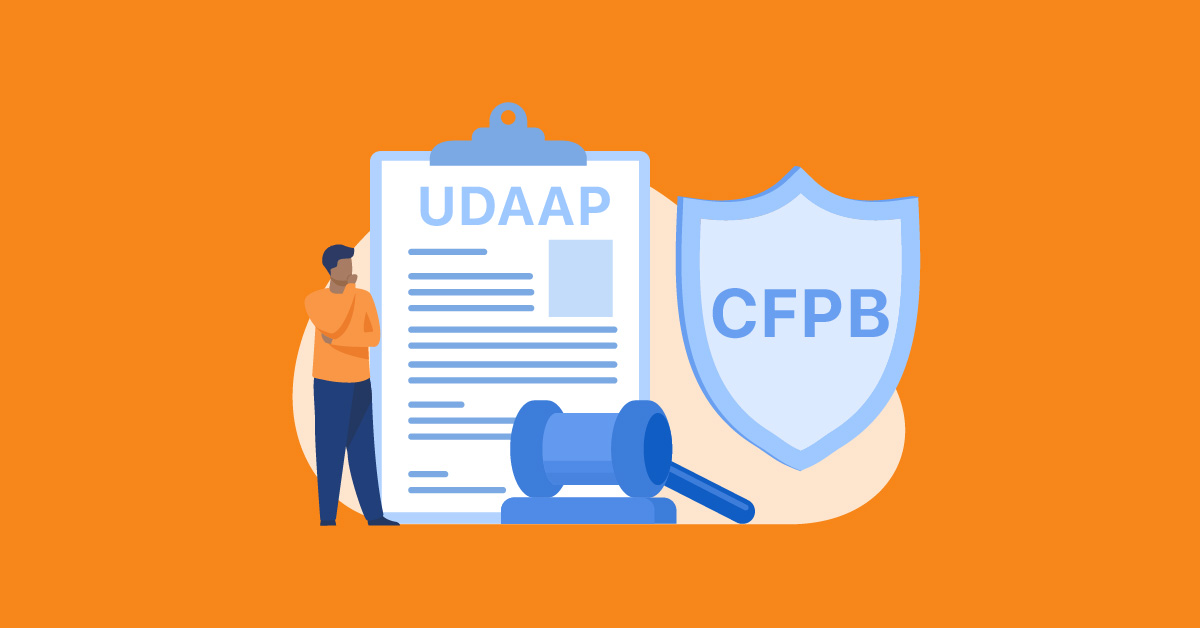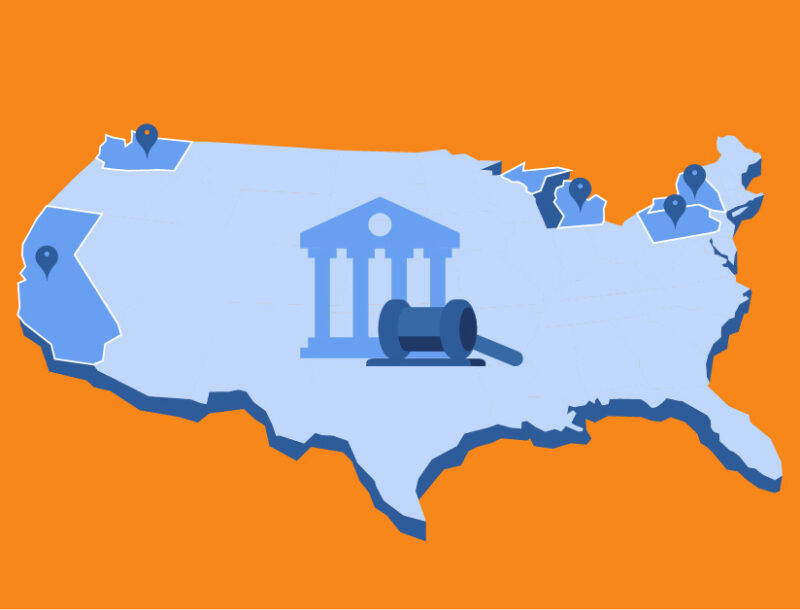Regulatory Notes: CFPB’s Abusive Policy Statement

The Consumer Financial Protection Bureau (CFPB) issued a policy statement that explains the legal prohibition on abusive conduct under UDAAP (Unfair, Deceptive, and Abusive Acts or Practices) in consumer financial markets and summarizes over a decade of precedent.
Below is a summary of the CFPB’s policy statement on abusive acts and practices and what it means for your organization.
Background: The CFPA + UDAAP
- The financial crisis of 2007-2008 exposed flaws in consumer protection laws
- Congress responded with the Consumer Financial Protection Act of 2019 (CFPA)
- The CFPA grants authority to the States, Federal banking agencies, and the CFPB to prevent unfair, deceptive, and abusive practices (UDAAP)
- The CFPA has been amended since its creation and government agencies have taken action to condemn abusive conduct
- The CFPB has issued this Policy Statement summarizing their actions and clarifying how they identify abusive acts or practices based on years of precedent
Material interference
- The first form of “abusiveness” under the CFPA and UDAAP is when a organization materially interferes with the ability of a consumer to understand a term or condition of a consumer financial product or service
- Material interference is when an act or omission is intended to impede consumers’ ability to understand terms or conditions, has the natural consequence of impeding consumers’ ability to understand, or actually impedes understanding
- Part of material interference can include actions or omissions that obscure, withhold, de-emphasize, render confusing, or hide information. This can take various forms, including:
- Buried disclosures
- Physical interference
- Digital interference
- Overshadowing
- Another aspect of material interference is making it hard for consumers to understand their terms or conditions. These can include:
- If a company intentionally makes its terms or conditions difficult to understand
- If an action or omission by the company makes it naturally hard for people to understand their terms or conditions.
- If the company’s actions or omissions actually make it hard for people to understand their terms or conditions
- A few other examples of material interference include:
- Not clearly explaining important parts of the terms and agreements
- A product or service is so complicated that material information about it cannot be easily or clearly explained
- Running the business differently from what it says in its agreement, making it hard to understand
- These types of acts or practices don’t have to be intentional to be guilty of material interference
Taking unreasonable advantage
- The second form of “abusiveness” under the CFPA and UDAAP is when organizations take unreasonable advantage of three specific circumstances: lack of understanding, inability to protect interests, and reasonable reliance
- CFPA prohibits companies from taking unreasonable advantage of these situations, even if the company did not create them
- Companies cannot benefit themselves unfairly, improperly, or excessively from these circumstances
- The CFPB considers several factors when evaluating whether a company has taken unreasonable advantage, such as whether the company benefits at the expense of the customer, uses the situation to gain leverage over the customer, or caused the situation in the first place
Lack of Understanding
- Organizations cannot take advantage of consumers’ lack of understanding regarding the material risks, costs, or conditions of their products or services
- Exploiting gaps in a consumer’s understanding is prohibited, which includes a consumer’s lack of knowledge about consequences or likelihood of default, monetary or non-monetary costs, and circumstances or attributes of the product or service
- Organizations can be held liable for abusive conduct even if they did not cause the consumer’s lack of understanding, and even if there is no contractual relationship between the organization and the consumer
- Consumers may lack understanding even if they are aware of the possibility of negative consequences or costs
- Organizations may not benefit from or be indifferent to certain negative consequences, and consumers may not understand that a risk is very likely to happen or that the impact of a particular risk would be severe
- Direct evidence, consumer complaints, analysis of reasonable consumer understanding, and course of conduct can all demonstrate a lack of understanding
- Ultimately, organizations must ensure that their products or services are clear and understandable to consumers, and they cannot exploit any gaps in understanding that may exist
Inability of Consumers to Protect Their Interests
- Organizations cannot take unreasonable advantage of consumers who are unable to protect their interests in selecting or using a consumer financial product or service
- “Interests” include monetary and non-monetary interests such as property, privacy, reputational interests, and limiting time/effort required to obtain and use products or services
- “Inability” includes situations where it is impractical to protect interests, such as unknown steps, especially difficult requirements, or lack of monetary means to protect interests
- Some examples of inability to protect their interests include:
- Customer relationships where people cannot exercise meaningful choice in selecting a provider or have no alternative recourse
- Form contracts and non-negotiable contractual provisions
- Market power of organizations and high transaction costs to exit the relationship
Reasonable Reliance
- Organizations cannot take unreasonable advantage of reasonable consumer reliance
- People expect organizations to make decisions or advise them in their interest and there is potential for exploitation of trust
- Reasonable reliance may exist where organizations communicate they will act in the customer’s best interest or assume the role of acting on behalf of consumers
- People should be able to rely on the entity to act on their behalf and function as a broker or other trusted source that helps people navigate marketplaces for consumer financial products or services
- Organizations that engage in certain forms of steering or self-dealing may be taking unreasonable advantage of consumers’ reasonable reliance
What this means for your organization
- The CFPB’s policy underscores the importance of a robust compliance program that emphasizes fair and transparent practices
- Following the CFPB’s policy can help organizations provide fair and transparent services to their customers while avoiding abusive practices
- Organizations that do not comply with the CFPB’s policy on abusive acts and practices could face significant legal and reputational risks
Takeaways
- Ensure transparency in communication: Organizations must make sure that all information related to their products and services is clear and understandable to consumers. Avoid burying important disclosures, obscuring, withholding, or hiding information in any form, as these can be considered material interference
- Don’t take advantage of consumers: Organizations should not benefit unfairly, improperly, or excessively from situations where consumers lack understanding, cannot protect their interests, or rely on the organization’s advice or decision-making. Consider the factors mentioned by the CFPB when evaluating whether a company has taken unreasonable advantage
- Educate your consumers: It’s essential to educate consumers about the material risks, costs, or conditions of the products and services offered. Exploiting gaps in their understanding is prohibited, even if the company did not cause the lack of understanding
- Consider the ability of consumers to protect their interests: Organizations must ensure they do not take unreasonable advantage of consumers who are unable to protect their interests while selecting or using a financial product or service. This includes monetary and non-monetary interests like property, privacy, and reputational interests
- Foster reasonable reliance: Organizations must ensure they do not take unreasonable advantage of consumers’ reasonable reliance. This means avoiding steering or self-dealing and acting on behalf of customers in their best interest.
- Monitor and analyze consumer complaints: Consumer complaints can serve as direct evidence and a course of conduct that can demonstrate a lack of understanding or other abusive practices. It’s essential to monitor and analyze them to prevent abusive compliance violations


